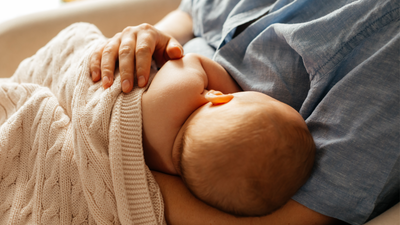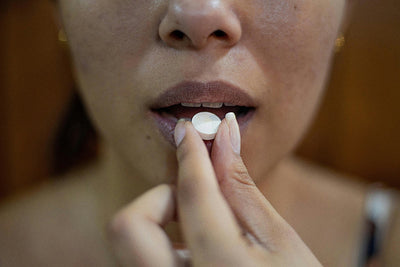Breastfeeding after Breast Cancer
Breastfeeding after Breast Cancer
by Katie Black
The information contained in this article is for educational purposes only. Always consult your doctor when making decisions about your medical treatments or breastfeeding.
While breasts are amazing for feeding a growing child, they’re also more at risk for cancer than other body parts. Besides skin cancer, breast cancer is the most common type of cancer for women in the U.S.. For every eight women in the U.S., one will be diagnosed with breast cancer in her lifetime.
Treatments for breast cancer depend on things like type, severity, genetics, response, and more. Some kinds of treatment make breastfeeding unlikely or even impossible, while you can still breastfeed after others.

Noninvasive breast cancer is when the cancer stays within the ducts or lobules. Invasive breast cancer means it has spread into the tissue around the ducts and lobules.
What is unilateral feeding?
Unilateral feeding just means you only nurse from one breast. If breast cancer treatment has made breastfeeding difficult or impossible from the breast being treated, it’s ok to just breastfeed from the other healthy breast.
It’s understandable to worry that this won’t be enough milk for a baby. If this is the case, keep in mind that any amount of breast milk has a lot of benefits even with supplementation. Plus it’s very possible you’ll make enough milk from one breast anyway.
It’s important to keep using the healthy breast often, while also taking care of any irritation. Any issues with latching should be dealt with ASAP. Seeking out a lactation consultant before giving birth will be your best bet for success at breastfeeding after breast cancer.
Mastectomy
A mastectomy is where the breast is surgically removed. Unfortunately that means you can’t breastfeed from that breast.
If you’ve had a double mastectomy but don’t want your baby to miss out on the benefits of breastfeeding, scroll to the bottom for resources that may help.
Lumpectomy
A lumpectomy is a surgery where the tumor or abnormal tissue is taken out, while keeping as much breast tissue as possible.
If the tumor was near the nipple, or the ducts or nerves were damaged during surgery, that breast may produce little or no milk. However that isn’t always the case and it may still be possible to breastfeed from that breast.
Radiation therapy
Radiation therapy uses high-energy rays or particles to target and destroy cancer cells.
After this treatment, the breast usually makes less milk due to damaged lobules, and sometimes can’t make any at all. The milk may change in its makeup or even have a darker color but there’s no evidence that it's harmful for a baby. If you want and are able to breastfeed from a breast treated with radiation therapy in the past, there’s no reason not to (unless other treatments make it unsafe of course).
Chemotherapy
Chemotherapy uses powerful drugs that flood the whole body, destroying fast-growing cells. It’s not safe to breastfeed while undergoing chemotherapy.
If you’re diagnosed with breast cancer while pregnant but still want to breastfeed, one solution is to pump and dump your breast milk until the treatment is over or paused and the drugs have left your system. Pumping doesn’t stimulate milk production as well as a suckling baby, so this may affect supply.
Considering how exhausting this time already is, adding constant pumping on top of all that is understandably too much for a majority of women. Currently, only 10% of women who are diagnosed with breast cancer during pregnancy end up breastfeeding.
Chemotherapy can also permanently change both healthy and affected breasts' ability to make milk. Even if treatment ended a while ago, you may find breastfeeding after chemotherapy difficult or even impossible, but it’s worth a try. It’s important to get help from an IBCLC before giving birth if you want to breastfeed and have had chemotherapy in the past.
Hormone therapy
Hormone therapy is used to treat hormone receptor-positive breast cancer. That just means that the cancer relies on hormones like estrogen or progesterone to grow. This treatment is often prescribed for years or even decades, even if the cancer is in remission.
Some hormone therapies use drugs like tamoxifen that bind to the hormone receptors on cancerous cells so estrogen can’t attach to them. Tamoxifen may hurt lactation. More importantly, it has a very long half life, which could mean the drug’s levels go up in breast milk over time. You should not breastfeed while taking Tamoxifen.
Aromatase inhibitors (AIs) stop your body from making estrogen by stopping the enzyme aromatase that converts androgens to estrogen. While the amount that gets passed into breast milk is probably small, the risk makes breastfeeding not worth it. Plus, there could be more of it over time. Estrogen is very important for bone and sexual growth in infants, and the negative effects of a baby not being able to properly make it would be permanent.
Targeted therapy
Instead of attacking all rapidly growing cells, like the name suggests, targeted therapy works on specific molecules that help the growth and spread of breast cancer. It’s generally not recommended to breastfeed while getting targeted therapy, but what about after treatment is over?
First off, some drugs remain in your system long after you’ve stopped taking them so be sure to consult your doctor for information or testing. There can also be long term health effects for your heart, lungs, bones, and digestive system which could make breastfeeding more tiring or hard. Targeted therapy can also disrupt the balance of your hormones, another way your ability to lactate could be affected.
Keep in mind that every person is different, and their body reacts differently to targeted treatment, so it’s definitely possible you can breastfeed after targeted therapy.
Relevant Reading: How Autoimmune Disorders Affect Breastfeeding (and vice versa)
Check ups
If you have a history of breast cancer, regular check ups are a must. The good news: check-ups are usually totally fine while breastfeeding and vice versa.
Ultrasounds, MRIs, and CT scans are all considered safe, as are contrast agents that are iodine or gadolinium based.
For biopsies, you might have some pain and swelling, and you may see a temporary dip in supply. Local anesthetics used during biopsies are usually safe for breastfeeding while general anesthesia may have you waiting a while before starting breastfeeding again.
The pain meds given after procedures are typically safe for breastfeeding mothers, but you should always double check with your doctor.
Other barriers
While there are a lot of physical barriers to breastfeeding after breast cancer, one of the biggest barriers is a lack of support from healthcare providers. Breastfeeding after breast cancer is often seen as impractical because of the extra care it requires.
A lot of women are also discouraged by well meaning loved ones who saw what a toll cancer took, and are worried about breastfeeding being another burden.
However, many women have said they found emotional healing and empowerment from breastfeeding after breast cancer. If you want to breastfeed, it’ll be vital to advocate for yourself with both doctors and loved ones. And once you have the support of those close to you, they should advocate for you too.
Additional resources
If you can’t breastfeed after breast cancer but don’t want your child to miss out on the benefits of breast milk, you might be able to get donor milk. While high risk infants are a priority, moms who have illness or health risks that stop them from breastfeeding often qualify to apply.
Check out:
The Human Milk Banking of North America
You should also check your health insurance policy to see if donor milk is covered.
Sources:
https://journals.sagepub.com/doi/10.1177/0890334419887723
https://www.ncbi.nlm.nih.gov/books/NBK501723/
https://www.ncbi.nlm.nih.gov/pmc/articles/PMC7947020/
Hale’s Medications and Mothers’ Milk 2023





